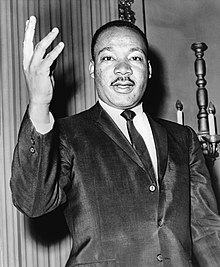Monday is the birthday of Martin Luther King, Jr., arguably
one of the most important Americans born in the 20th century. But why is he important? What did he do that
would justify such a lofty statement? At
Mass this morning our Pastor began his Homily with a simple statement, “Who do
you look down upon?” His point was that
no matter who you are, or how enlightened or pious one may believe they are we
all carry some prejudice against someone, or some group. Where did this come from? Are we born with it? Or do we learn it? Who instills it? Who
nurtures it? Who inflames it?
I grew up
in a northern suburb of Chicago and from my earliest childhood memories I
remember my Uncle Willie who, usually after a Boiler Maker or two, would refer
to African Americans using the most ugly and offensive epithets
imaginable. Unfortunately he wasn’t alone
in his views. Although my parents did
not condone this sort of talk, they didn’t shut it down either. This was the
mid to late 1960’s and it was a tumultuous time in our country where racial
issues and tensions were divisive, explosive, misunderstood and very delicate. I
don’t think that my parents believed what my Uncle Willie said, and I don’t
think they consider themselves racist.
However, this is where the nurturing part comes in. All you have to do is listen to someone
discuss racial issues and you will learn what they really think. Not necessarily by what they say, but how
they say it; their body language, and most importantly – what they don’t say
will give them away every time. I know
what I believe, but often there is this voice I hear in the back of my head
(these aren’t the voices that medication silences J) where I hear my Uncle Willie
and this infuriates me! Why does this
STILL come up? Although I believe I have
moved beyond racial and gender prejudices, I know I still prejudge certain
groups of people. How about you?
Each year at this time I make it a point to read what I feel
is the greatest, most powerful, and potent speech ever given in my
lifetime. This is the speech that Dr.
Martin Luther King, Jr. gave at the steps of the Lincoln Memorial on the Washington
Mall on August 28th, 1963 which has become known as the, “I Have a
Dream Speech”. Many believe this was the
defining moment of the Civil Rights movement where he called for racial
equality and the end of discrimination. If
you haven’t read this, or maybe not in awhile, please take a moment to read
it:
Although the times have changed, we haven’t made as much
progress here as you might think. Yes,
we have an African American in the White House, and that’s huge, however racial
tensions and issues in this country are still front and center. Just look at
the immigration debate taking place throughout this country. As I look around, you can replace his use of
the term, Negro with Latino, Asian, Indian, Middle Eastern, Eastern European,
Immigrant, Homosexual, Woman, Man, Caucasian, Poor, Homeless,
fill-in-the-blank. Justice, opportunity,
and happiness are not relegated to just skin color, gender, or sexual
orientation. The socio-economic status
of each of us has much to do with this as well.
The whole Occupy Wall Street movement (which remains poorly defined) is a
powerful indication of how the middle class is being diminished and the
wealth/income disparity is widening at an alarming pace. Paul Krugman wrote a thought provoking Op-ed
piece in the New York Times on January 8 entitled, America’s Unlevel
Field. My point in bringing this up is
NOT to embark on a political argument, but rather to get you thinking about
what is actually taking place in this country of ours, and it’s not at all what
our politicians would have us believe from their 30 second sound bites.
I’ll leave you with two things. First is a link to Mr. Krugman’s
article.
Secondly, an excerpt from Dr. King’s speech:“…But there is something that I must say to my people, who stand on the warm threshold which leads into the palace of justice: In the process of gaining our rightful place, we must not be guilty of wrongful deeds. Let us not seek to satisfy our thirst for freedom by drinking from the cup of bitterness and hatred. We must forever conduct our struggle on the high plane of dignity and discipline. We must not allow our creative protest to degenerate into physical violence. Again and again, we must rise to the majestic heights of meeting physical force with soul force…”
So, who do you look down upon?




